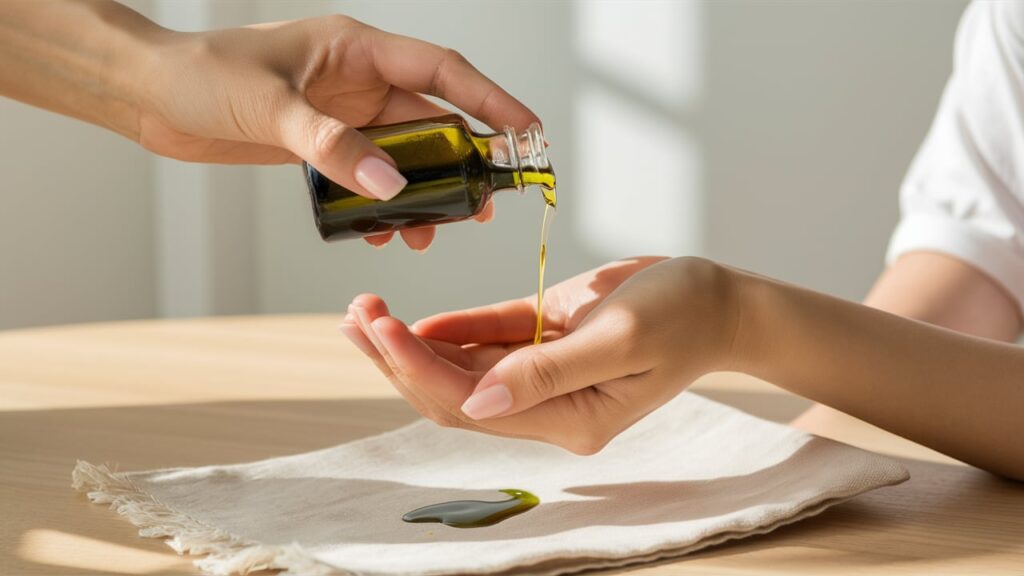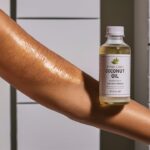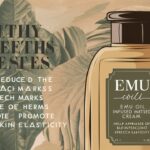- Avocado oil may help prevent new stretch marks but evidence for removal is limited.
- More research is needed to confirm avocado oil’s effectiveness in stretchmarks
- Combine avocado oil with other skincare practices for best results
Natural remedies have gained attention for their potential skincare benefits. Avocado oil has emerged as a promising candidate for preventing and reducing the appearance of stretch marks.
What are stretch marks?
Stretch marks, known medically as striae, are a common skin concern for many, particularly women, during and after pregnancy.
The marks occur when the skin is stretched rapidly, often due to pregnancy, weight gain, or growth spurts.
As the skin stretches, it can tear, forming unsightly scars that many find challenging to reduce or eliminate.
Natural Ingredients For Stretch Marks: Why They May Not Work
Avocado Oil: A Nutrient Powerhouse
Avocado oil, extracted from the pulp of the avocado fruit, is rich in unsaturated fatty acids, vitamins, and polyphenols. These components are known to enhance skin elasticity and promote moisture retention. The oil’s high concentration of oleic acid, a monounsaturated fatty acid, makes it an excellent moisturizer that may improve the appearance of stretch marks.
“While there are no direct scientific studies conclusively proving that avocado oil can completely remove established stretch marks, its potential in prevention and skin health is promising,” notes an article from Typology that focuses on avocado oil’s role in pregnancy-related stretch marks.
Pregnancy and Stretch Marks: Can Avocado Oil Help?
One of the most common times for stretch marks to develop is during pregnancy. As the skin stretches to accommodate a growing baby, it can become overstretched, forming striae. While avocado oil may not completely remove existing stretch marks, it could help prevent new ones from forming.
Applying pure avocado oil to at-risk areas during pregnancy and postpartum may help minimize the onset of stretch marks. The oil’s ability to penetrate the skin and its moisturizing properties make it a valuable addition to a stretch mark prevention routine.
Consumer Preferences: Oils Take the Lead
A systematic study published in JMIR Dermatology analyzed consumer preferences for products to prevent and treat stretch marks. It found that oils, including avocado oil, were the most commonly used products.
Consumers tend to prefer oils because of their natural origins and moisturizing capabilities.
However, the study also highlighted conflicting evidence regarding the effectiveness of various oils, including olive oil, in preventing stretch marks. This points to the need for further research to establish definitive benefits.
The Science Behind Avocado Oil: Preventive Potential
A study published in Scientific Research Publishing evaluated a lotion containing avocado oil and other botanical extracts for its preventive effects on stretch marks. The results were promising, showing that the lotion could decrease the contractile forces of fibroblasts from early stretch marks. This suggests that avocado oil, in combination with other ingredients, may help prevent the formation of stretch marks.
The study emphasized the synergistic effects of the ingredients, including avocado oil’s moisturizing and anti-inflammatory properties. These properties are essential for maintaining skin health and resilience against the physical changes that can lead to stretch marks.
A Blend of Plant Oils: Enhancing Skin Quality
In another study published in the International Journal of Cosmetic Science, a randomized controlled trial examined the effectiveness of a blend of plant oils, including avocado oil, in improving the appearance of stretch marks.
Participants reported improvements in skin texture and appearance in the treated areas compared to the untreated ones.
The fatty acids in plant oils, including avocado oil, may enhance skin quality and reduce the visibility of stretch marks. These results prove that avocado oil could be valuable to skin care routines that manage stretch marks.
The Verdict: A Promising Yet Unproven Remedy
While avocado oil may benefit skin elasticity and moisture retention, more scientific studies are needed to establish its effectiveness in conclusively preventing or treating stretch marks.
The existing research provides a strong foundation for further exploration, but consumers should remain informed and cautious in their expectations.
“Avocado oil is undoubtedly a nutrient-rich option for those looking to improve their skin’s health and resilience, but it’s not a miracle cure,” One study concludes.
Embracing Natural Remedies: A Step Towards Skin Health
The emotional impact of stretch marks can be significant for individuals struggling with them. These marks often affect self-esteem and body confidence, leading many to seek treatments to help them feel more comfortable in their skin.
With its natural origins and potential benefits, Avocado oil offers a gentle and nourishing option for those looking to take care of their skin.
Whether used as part of a preventive routine during pregnancy or as a moisturizing agent in daily skin care, avocado oil provides a natural alternative to more invasive treatments.
Moving Forward: The Need for More Research
While the current evidence suggests that avocado oil may have some benefits in preventing and reducing the appearance of stretch marks, more research is needed to understand its potential fully.
Future studies should aim to explore the long-term effects of avocado oil on stretch marks and its effectiveness compared to other treatment options.
In the meantime, those interested in using avocado oil in reducing stretch marks should do so with realistic expectations. As with any skin care product, results may vary, and it’s essential to approach treatment with patience and consistency.
User Testimonials
There are limited direct testimonials or opinions from users claiming avocado oil effectively reduced their stretch marks. The discussions mention avocado oil as a potential natural remedy but do not provide conclusive evidence of its efficacy.
- Essential Day Spa forum
User: Cadia
“I started using avocado oil based on that thread, but sadly, I think I screwed up in my order and wound up getting a somewhat refined oil. I try to get only cold-pressed, unrefined organic oils, but it can be tricky. Based on your review, I’ll keep my eye out for that next time!” - Green Parenting
User: skincareaddicted
“I have been using avocado oil for about a month and love it. I was afraid it would be too heavy for my skin, but I think it’s perfect if you use just the right amount on wet skin.” - What to Expect forum
User: Avocado oil And coconut oil
“Avocado oil and coconut oil—both found in the cooking aisle—read up about their natural benefits.”
Dermatologist opinions
Dermatologists have shared insights regarding the use of avocado oil with stretch marks, emphasizing its moisturizing properties rather than its ability to eliminate them.
Dr. Dendy Engelman states,
“No oil will get rid of your stretch marks, but applying oils can help keep the skin hydrated and may improve its appearance over time”.
Similarly, Dr. Caroline Robinson highlights the importance of layering oils over thicker moisturizers to enhance hydration in areas prone to stretch marks .
While avocado oil is often included in formulations for its nourishing benefits, it is crucial to understand that stretch marks are a natural occurrence and largely influenced by genetics and skin elasticity.
Therefore, while avocado oil can contribute to skin hydration, it is not a guaranteed solution for preventing or removing stretch marks.

I’m a devoted organic skincare enthusiast, passionate about the natural, wholesome goodness that organic products bring to our skin.
Organic skincare isn’t just a hobby for me—it’s a lifestyle. Every product I use, recommend, and write about has been carefully chosen for its purity and effectiveness. Everything I write about is backed by scientific studies, dermatologists’ opinions, and user experiences.
I also excel at tackling skincare challenges with innovative, organic solutions.


